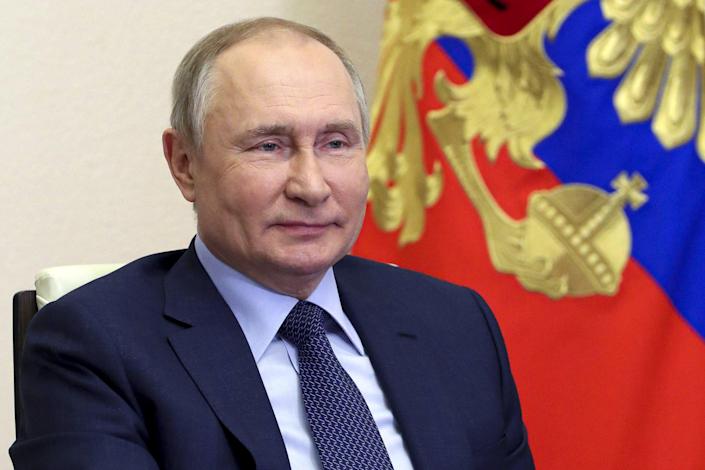Right now Vladimir Putin is losing the battle for Ukraine. His maximal goals have been abandoned (for now), his troops around Kyiv are in retreat, his imperial dreams are being disavowed. He has more modest goals to fall back on, resources and territories that he may be able to hold — but a month of Ukrainian valor and Western support have dealt his ambitions a devastating blow.


Putin is not losing, however, in the battle for Russia. From the start of hostilities, the Western answer to his maximalist ambitions — not an official goal, but a hope that informs policy and punditry and slips out of Joe Biden’s lips in excited moments — has been regime change in the Kremlin, a failed war toppling Putin and bringing a more reasonable government to power.
This was always a thin hope, but despite military quagmire and unprecedented economic sanctions, it appears even thinner now. In polling and anecdote alike, Putin appears to be consolidating support from the Russian public, rallying a nation that feels itself to be as he portrays it — unjustly surrounded and besieged.
His approval ratings, according to Russia’s main independent pollster, look like George W. Bush’s after 9/11. His inner circle has always been unlikely to break with him, for reasons sketched by Anatol Lieven in The Financial Times a few weeks ago: Its members mostly come from the same background, share the same geopolitical assumptions, and are far more likely “to fight on ruthlessly for a long time” than to suddenly turn against their leader. But even in the wider circle of Russian elites, the war so far has reportedly generated more anti-Western solidarity than division.
“Putin’s dream of a consolidation among the Russian elite has come true,” journalist Farida Rustamova reported from her recent conversations.
It is, of course, reasonable to question both anecdote and data from a system that punishes dissent. But these kinds of patterns should not be surprising. Yes, failed wars sometimes bring down authoritarian regimes — like the Argentine junta after its misadventure in the Falkland Islands. But externally imposed sanctions, economic warfare, often end up strengthening the internal power of the targeted regime. In the short run, they supply an external scapegoat, an obvious enemy to blame for hardship instead of your own leaders. In the long run, the academic literature suggests, they may make states more repressive, less likely to democratize.
Just consider the list of bad-actor countries that the United States has used sanctions against for long periods of time. From Cuba to North Korea, Iran to Venezuela — not to mention Iraq before our 2003 invasion — the pattern is predictable: The people suffer, the regime endures.
It should be our assumption — not a certainty, but a guiding premise — that the same will be true of a sanctioned and isolated Russia. Even if the rally to Putin fades as the economic pain increases, the forces empowered by Russian suffering will not be liberal ones. And any leadership change is more likely to resemble Nicolás Maduro succeeding Hugo Chávez than it is the revolutions of 1989.
This assumption has two implications. The first is for the war itself: In the near term, whatever Ukraine regains, it will regain on the battlefield, not through some deus ex Moscow delivering a friendlier Russian government to the negotiating table. This does not imply the United States should suddenly escalate militarily, dancing closer to a nuclear conflict. But it does imply that sustaining support for the Ukrainian military is our most important policy, with sanctions playing only a supporting role.
The second implication is for the long term, once peace in some form is established. Especially if that peace is a frozen conflict, in which Putin claims victory by holding onto some Ukrainian territory, there will be pressure to leave the sanctions in place, to continue the war indefinitely by other means.
There will be an argument for doing exactly that, but we should be clear on the nature of the case: Namely, that even absent open war, Russia will remain a generational enemy to peace in Europe and a generational threat to American interests — making policies that diminish Russian wealth and power a justified form of self-defense, both for Europe’s eastern borders and for the wider Pax Americana.
The argument will not be that sanctions are likely to deliver the Russian people from Putin’s rule, or that collective economic punishment is likely to be somehow worth it for the Russians themselves, come some hypothetical future revolution.
No, if we intend to make economic war on Russia for a generation, we should be cleareyed about the calculus. In the hopes of making a dangerous great power as weak as possible, we will make it more likely that Putinism rules for decades, and that Russia remains our deadly enemy for as long as anyone can reasonably foresee.
Douthat writes for The New York Times.
This article originally appeared on Austin American-Statesman: Douthat: Putin is losing in Ukraine. But he’s winning in Russia.



